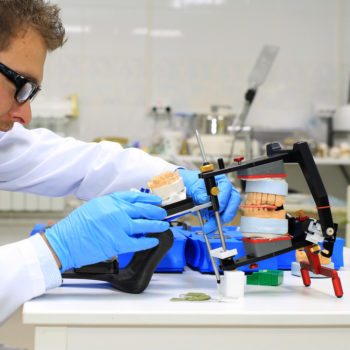Why We Love It
-
$171,040Potential Avg. Salary
-
9%Job Growth Rate
-
Growing DemandJob Outlook
-
Dependable Daily WorkloadCareer Attribute
Periodontists are dentists that receive special training to focus on the treatment of gum disease and the installation of implants. Usually, patients are referred to periodontists by their general dentist when special care is needed for treatment of gum disease or replacement of missing teeth with implants.
Recommended Schools
What is a Periodontist?
The following job responsibilities are common for individuals in periodontist roles:
- Perform examinations identify and diagnose the extent to which of gum disease has progressed
- Perform scaling and root planing procedures to removed damaged gum tissue, remove gum disease, and encourage healing
- Examine patient gums and bones to determine viability for dental implant installation
- Install, maintain, and repair dental implants in cases where natural teeth have been removed or are no longer viable
A Day in the Life
Periodontists are dentists that specialize in treating gums and installing dental implants. When a patient of a general dentist is suffering from severe gum disease or needs to have a removed tooth replaced with a dental implant, the general dentist will often refer his/her patient to a periodontist for treatment. Periodontists undergo additional training after earning a general dentistry degree in order to learn how to properly treat gums and install dental implants, and often only see patients with severe issues.
When a patient has gum disease that has progressed so much that it’s no longer treatable with prescription mouthwashes or lasers by the general dentist, the periodontist steps in and performs more advanced procedures like scaling and root planing to clean gums, remove damaged tissue, and encourage healing. Gum disease can cause tooth loss and other health issues, so the role of the periodontist is often critical in helping patients retain and preserve their natural teeth.
When patients do lose teeth, either because of gum disease, severe decay, or extraction, periodontists take care of installing dental implants to replace missing teeth. Dental implants are often preferred over false teeth because they attach to the jaw bone and function more like natural teeth. Periodontists evaluate the ability of a patient’s jaw to support implants, and if everything looks good, will install the hardware and implants. Periodontists also repair and maintain implants after installation.
Typical Work Schedule
Most periodontists work full-time during normal business hours and are off on weekends and holidays. However, periodontists may need to be on call at any time to handle patient emergencies.
Projected Job Growth
Dentists of all specialties, including periodontists, are expected to see job growth in the coming decade due to increased insurance coverage and greater awareness of the importance of dental health.
Typical Employers
Periodontists generally operate their own practices—either individually or with other dentists as part of a group practice. However, some periodontists may also be employed by hospitals to handle emergency dental patients.
Recommended Schools
How To Become a Periodontist
To become a periodontist, you must successfully complete three levels of education. The first step is earning a bachelor’s degree, which is a requirement for admittance to dental school. Some students study dentistry as undergraduates, though the type of bachelor’s degree earned isn’t usually a stringent requirement for admittance into a dentistry school. However, aspiring dentists should make sure to take plenty of science courses during their undergraduate studies to better prepare for dental school.
After earning a bachelor’s degree, you’ll need to be admitted into a professional dentistry program. Graduate dentistry programs offer one of three degrees: Doctor of Dental Surgery (DDS), Doctor of Dental Medicine (DDM), or Doctor of Medical Dentistry (DMD). With any of these three degrees, you’ll be able to take the written and practical examinations required to become licensed as a general dentist in your state of practice. You can then find work as a family or general dentist.
To specialize in periodontics, you’ll have to follow up earning your dentistry degree by entering a specialty program. Specialty periodontics programs require another two or more years in specialized education and a residency where you can focus study on periodontics to become an expert in that field. After completing this additional program, you’ll be certified as a periodontist, but you may need to take additional written and practical tests to become licensed to perform periodontics in your state.
Periodontist Salary Data
We’ve provided you the following to learn more about this career. The salary and growth data on this page comes from recently published Bureau of Labor Statistics data while the recommendations and editorial content are based on our research.
National Anual Salary
Low Range
$92,270Average
$171,040High Range
---National Hourly Wage
Low Range
$44/hrAverage
$82/hrHigh Range
---How do Periodontist salaries stack up to other jobs across the country? Based on the latest jobs data nationwide, Periodontist's can make an average annual salary of $171,040, or $82 per hour. On the lower end, they can make $92,270 or $44 per hour, perhaps when just starting out or based on the state you live in.
Salary Rankings And Facts
#13 Nationally for All Careers
Above Average Salary Nationally
Highest Education Among Periodontists
- 95.5% Doctorate
- 2.1% Masters
- 1.7% Bachelors
- 0.3% Associates
- 0% College
- 0.3% High School
- 0.2% Less than High School
Job Growth Projections and Forecast
2014 Total Jobs
6,7002024 Est. Jobs
7,300Job Growth Rate
9%Est. New Jobs
600How does Periodontist job growth stack up to other jobs across the country? By 2024, there will be a change of 600 jobs for a total of 7,300 people employed in the career nationwide. This is a 9% change in growth over the next ten years, giving the career a growth rate nationwide of Above Average.
Growth Rankings And Facts
#244 Nationally for All Careers
Above Avg. Growth Nationally
What Companies Employ The Most Periodontists
| Industry | Current Jobs | New Jobs Needed | % Increase |
|---|---|---|---|
| Offices of dentists | 2,900 | 600 | 1% |
| Federal government, excluding postal service | 2,300 | -200 | 0% |
| Self-employed workers | 1,000 | 200 | 0% |












